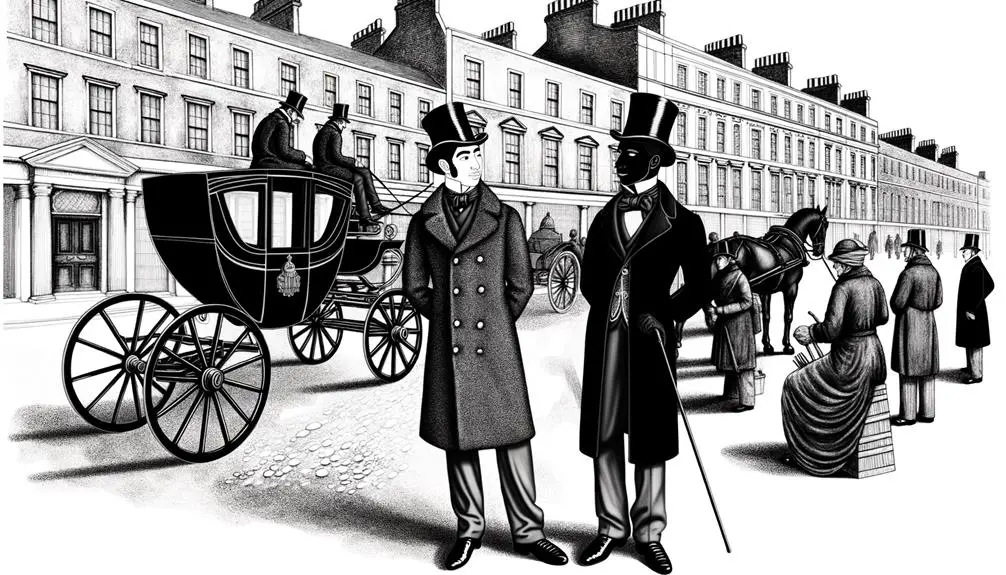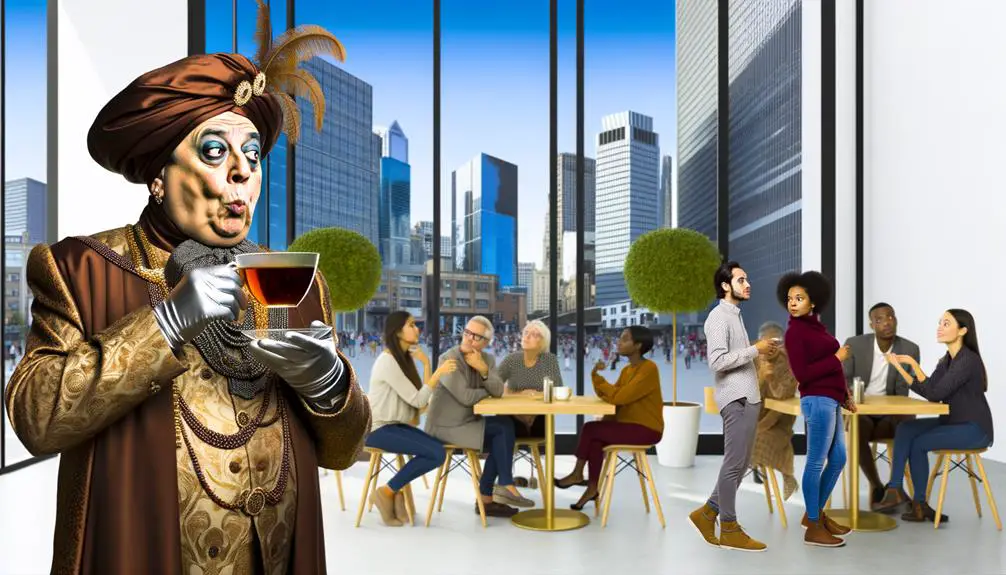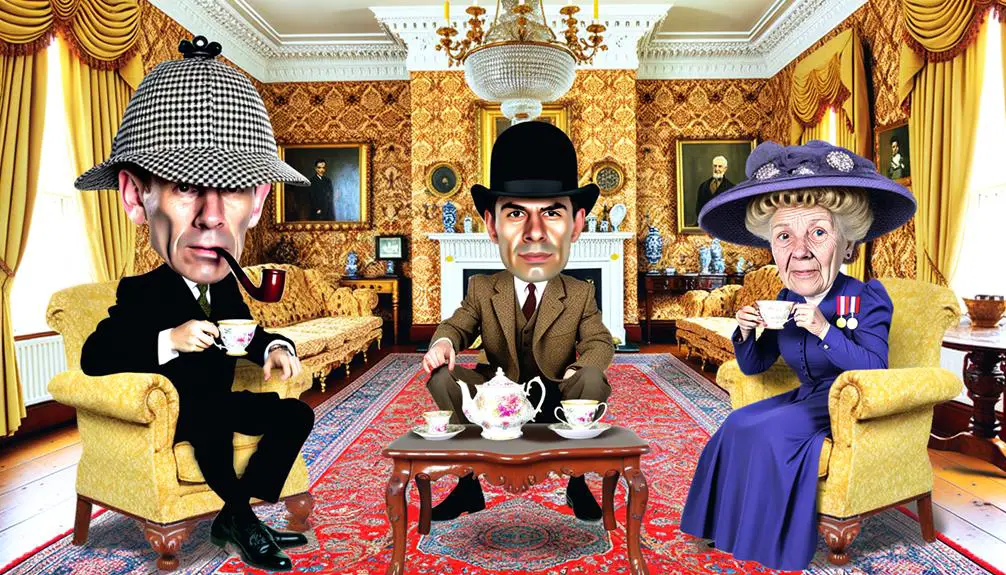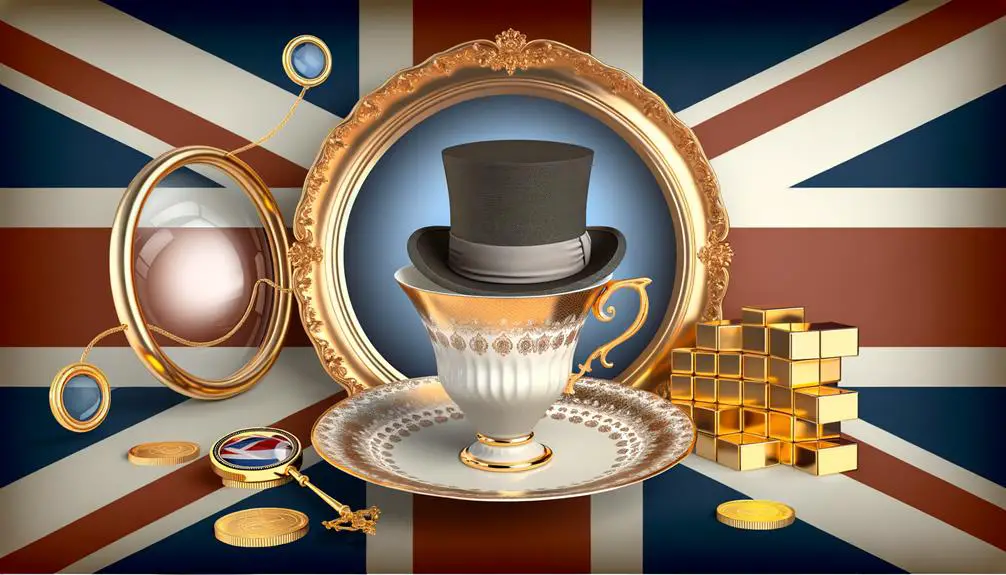In your quest to understand 'toff,' you're encountering a term born from 19th-century British slang, intricately tied to social elitism. Originally derived from 'tuft,' a reference to the ornamental cap tassels worn by aristocratic university students, 'toff' has evolved. It now encompasses a broader spectrum of the upper class, reflecting deep-rooted class distinctions within British society. This linguistic shift mirrors ongoing societal dialogues about class and privilege, embodying complex cultural nuances. 'Toff' doesn't merely denote wealth; it conveys a constellation of social expectations, attitudes, and lifestyles. Grasping its full implications opens avenues to explore intricate societal structures.
The Origins of "Toff"

The term 'Toff,' commonly used to denote a person of high social status, originated in 19th-century Britain, embodying the class distinctions prevalent during that era. Your exploration into its etymology reveals a fascinating journey of linguistic evolution, reflecting social dynamics and cultural shifts. The word 'Toff' is believed to have derived from the earlier slang 'tuft,' a reference to the gold tassel worn on the caps of those attending prestigious universities, signaling their elite status. This etymological investigation uncovers the nuanced ways in which language mirrors societal structures and perceptions.
As you investigate further, you'll find that 'Toff' underwent significant linguistic evolution, its usage expanding beyond the confines of university elitism to encompass a broader definition of the upper class. This expansion signifies not just a change in language but a reflection of the evolving social landscape of Britain, where class distinctions, though still present, began to blur. Analyzing 'Toff' through the lens of linguistic evolution offers you insights into the complex interplay between language, identity, and social hierarchy. It highlights how words can both reinforce and challenge societal norms, making 'Toff' a compelling case study in the dynamics of social language.
Decoding the Meaning
Having explored the origins of 'Toff,' let's now decode its contemporary meaning and implications within modern British society. The term 'Toff' has undergone significant linguistic evolvement, shifting from a mere descriptor to a complex label imbued with both cultural and social nuances. This evolvement reflects broader societal changes and attitudes towards class and privilege.
The contemporary use of 'Toff' isn't merely an identification of someone from the upper echelons of society but carries with it a set of assumptions about values, behavior, and lifestyle. It's a manifestation of the ongoing dialogue between different social strata, serving as a linguistic tool that both connects and divides.
The cultural impact of 'Toff' is profound, offering insight into the British class system's resilience and the persistent fascination with, and sometimes disdain for, the aristocracy. It encapsulates the tension between admiration for tradition and the critique of inherited privilege.
Understanding 'Toff' in today's context requires an appreciation of its dual nature: as a relic of historical class distinctions and a living, breathing part of contemporary discourse. This duality is at the heart of its linguistic evolvement and cultural impact, making 'Toff' a uniquely revealing lens through which to view British society.
"Toff" in Modern Usage

As you explore the concept of 'Toff' in contemporary contexts, it's essential to contemplate how stereotypes persist and evolve.
The portrayal of 'Toffs' in popular media offers insights into societal perceptions and the nuances of class distinctions.
This analysis will shed light on the complexities of this slang term's modern usage and its cultural implications.
Toff Stereotypes Today
In contemporary discourse, one often encounters the term 'toff' used to describe individuals perceived as belonging to the upper echelons of society, replete with stereotypes of elitism and privilege. Toff fashion and Toff hobbies serve as central elements in the perpetuation of these stereotypes.
You'll find that toff fashion typically encompasses traditional, high-end attire, signaling wealth and a conservative aesthetic. Think tailored suits, designer labels, and exclusive accessories. Similarly, toff hobbies are characterized by pursuits that require significant financial investment and social connections, such as polo, yachting, and attending prestigious events.
These activities not only denote a lifestyle of leisure and opulence but also reinforce the social barriers that segregate toffs from the wider populace, underlining the exclusivity and insularity inherent to their world.
Toff in Popular Media
The portrayal of toffs in popular media often reflects and amplifies societal perceptions of upper-class stereotyping, embedding these images within the collective consciousness.
You'll notice that toff fashion and toff humor are pivotal elements in this depiction, serving as vehicles through which these stereotypes are both conveyed and critiqued.
Toff fashion, with its quintessential tailoring and distinctive accessories, becomes a visual shorthand for wealth and privilege, while toff humor, characterized by its wit and often self-deprecating nature, subtly addresses the absurdities and contradictions within the upper class.
This dual approach allows popular media to navigate the fine line between perpetuating stereotypes and offering nuanced commentary on the complexities of class identity, thereby shaping your understanding of the term 'toff' and its implications in today's society.
Class and "Toff" Slang
You must understand that the term 'Toff' isn't merely a casual epithet but a linguistic artifact that reveals much about British social hierarchies.
Its origins and evolution trace the contours of class distinctions, highlighting how language functions as a marker of social status.
Origins of 'Toff'
Delving into the term 'toff,' one discovers its roots deeply embedded in the intricate social fabric of 19th-century Britain, where it emerged as slang to describe the affluent upper class. This linguistic development wasn't incidental but a reflection of the era's attitudes and the cultural implications of language evolution.
| Aspect | Description | Implications |
|---|---|---|
| Era | 19th-century Britain | Social stratification |
| Slang Origin | Upper class affluence | Class distinction |
| Language Evolution | Reflects societal attitudes | Cultural identity |
This exploration reveals how 'toff' not only articulated a social reality but also influenced perceptions of class and culture, underscoring the dynamic interplay between language and society.
Toff and Social Status
In examining how 'toff' reflects social hierarchies, it's imperative to understand its role in distinguishing class status within British society. The term not only conveys affluence but also suggests a particular lifestyle and set of values associated with the upper echelons. Toff attire, characterized by its elegance and adherence to traditional fashion, serves as a visual marker of this status, reinforcing social distinctions.
Moreover, the relationship between 'toff' and social mobility is complex. While the term denotes a certain prestige, it also highlights the rigidity of social stratification. It suggests that despite changes in economic circumstances, the cultural and social capital associated with being a 'toff' remains elusive for many, underlining the enduring influence of class in shaping identity and opportunity in British society.
Famous Toffs in Media

Several characters in media exemplify the quintessential 'toff,' offering insight into the portrayal of upper-class stereotypes through their narratives and interactions. These portrayals provide a unique lens through which we can examine the accuracy of 'toff' representation and its influence on public perception.
- Accuracy of Toff Portrayal: Often, media depictions lean towards exaggeration, highlighting the flamboyant and out-of-touch aspects of the upper class. This raises questions about the authenticity of such portrayals and whether they do more harm than good in understanding the complexities of class distinctions.
- Media Influence on Toff Perception: Television shows and films play a significant role in shaping public perceptions of the 'toff' archetype. Through repeated exposure to these exaggerated characters, audiences may begin to accept these portrayals as truth, further entrenching stereotypes.
- Character Analysis: Delving into specific characters from popular media can provide a deeper understanding of how toffs are depicted and the subtleties that may be overlooked in a broader analysis.
- Stereotype Reinforcement: The persistent depiction of toffs in a certain light serves to reinforce stereotypes, potentially influencing how the upper class is viewed in reality.
Changing Perceptions of "Toff"
While the prior discussion highlighted media's role in shaping stereotypes of the 'toff', it's important to explore how these perceptions are evolving. The term 'toff', once mostly used with a certain disdain or envy, is undergoing a significant transformation in its social perception and relevance. This shift can be attributed, to some extent, to a growing 'toff backlash', a phenomenon where the caricatured images of privilege and disconnectedness no longer resonate as they once did.
Contemporary relevance of the term has been shaped by a more nuanced understanding of socio-economic complexities. You can observe this in the way public discourse around privilege, wealth, and class has matured. The backlash isn't merely a rejection of the stereotypical 'toff' but a critique of the broader systemic issues that allow such stereotypes to flourish.
Moreover, the changing perceptions indicate a societal move towards valuing authenticity and merit over inherited status. This evolution reflects in the language we use and the stereotypes we challenge, marking a significant shift in the cultural narrative around class and privilege in the UK. Therefore, the term 'toff' is no longer just a label but a lens through which to examine these broader societal changes.
Frequently Asked Questions
How Does the Use of 'Toff' Slang Differ Across Various Regions of the United Kingdom?
You'll find that the term "toff" varies across the UK, reflecting regional pride and dialect evolution. Its usage and connotations differ, offering insight into how language adapts to cultural and societal shifts.
Can the Term 'Toff' Be Considered Offensive, and Under What Circumstances?
You might find 'toff' offensive depending on its use, highlighting class distinctions. Social etiquette varies; in some contexts, it's playful, while in others, it underscores derogatory attitudes towards wealth and privilege, demanding careful consideration.
Are There Any Notable Instances Where 'Toff' Slang Has Significantly Impacted British Politics or Social Movements?
You might wonder how a single term could sway politics or society. Yet, 'toff' origins and its cultural impact reveal its power. It's subtly influenced movements, though not always front and center in public discourse.
How Do Younger Generations in the UK Perceive and Use the Term 'Toff' Compared to Older Generations?
You've noticed younger generations in the UK, influenced by social media and fashion trends, use 'toff' differently than older generations. They often repurpose it with irony or affection, diverging from traditional, class-based connotations.
Have There Been Any Significant Legal Cases or Controversies in the UK Involving the Use of the Term 'Toff'?
You haven't seen significant legal cases or controversies in the UK specifically about "toff." Its origins and linguistic evolution suggest it's more a social marker than a legally contentious term. Analyzing its usage reveals no legal disputes.
Conclusion
To sum up, 'toff', a term deeply rooted in British slang, epitomizes the complexities of class distinction. Its evolution from a mere descriptor to a nuanced symbol of societal stratification underscores the dynamic nature of language.
Consider the character of Bertie Wooster, created by P.G. Wodehouse, who personifies the quintessential 'toff' with his affluence, idleness, and distinctive manner of speech. This example illustrates how 'toff' transcends its literal meaning, reflecting broader cultural attitudes towards class and privilege.







